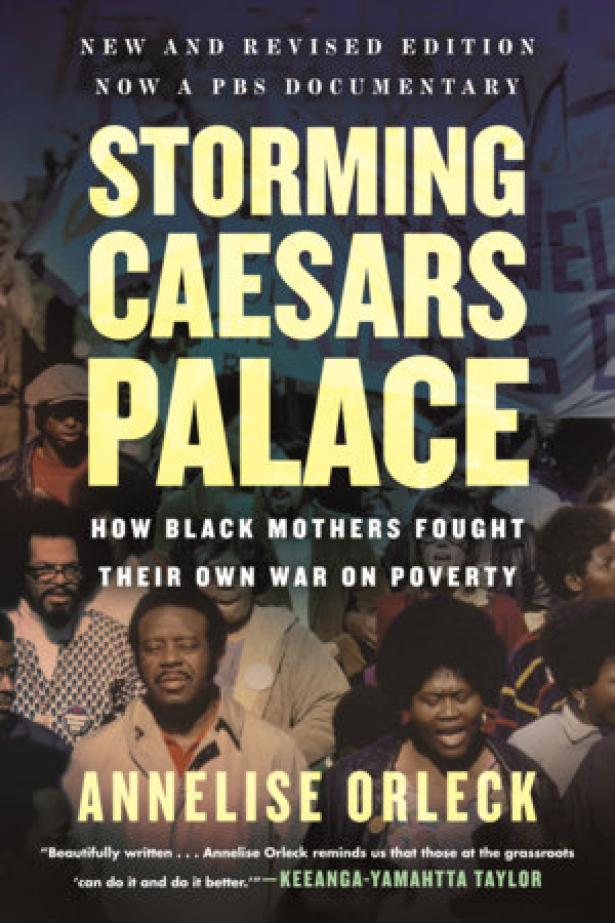Storming Caesar's Palace
How Black Mothers Fought Their Own War on Poverty
Revised and Updated
Annelise Orleck
Beacon Press
ISBN 9780807007976
When Dartmouth history professor Annelise Orleck was still working on her first book, Common Sense and a Little Fire: Women and Working Class Politics in the United States, 1900-1965, she learned about the work of an intrepid group of low-income, southern-born women in Las Vegas, Nevada. Thirteen years of research and interviews followed. The result, Storming Caesars Palace: How Black Mothers Fought Their Own War on Poverty, tells the amazing story of fed-up and reviled welfare recipients who organized on their own behalf, winning a raft of financial, medical and educational improvements for themselves, their children and their westside community.
Although the book was initially released in 2006, an updated edition was recently reissued to coincide with a PBS Independent Lens documentary directed by Hazel Gurland-Poole. Both the book and the film are inspiring and not only look back at the once-powerful welfare rights movement of the 1960s and 70s, but offer stark and timeless lessons about community organizing, movement building and risk taking.
The story centers around the Clark County, Nevada Welfare Right Organization (CCWRO) head Ruby Duncan, a mother of seven who was forced onto welfare when she became disabled. Like others in similar straits, Duncan was initially ashamed of having to go on the dole. But as she and her neighbors parsed this reaction, they quickly realized that it was more shameful to let children go hungry than it was for parents to demand food, shelter, healthcare and job training from the state.
Like the National Welfare Rights Organization (NWRO), the CCWRO was bold and unapologetic. In the early 1970s, for example, when budget cuts were proposed by state lawmakers, the women brought a group of kids into casino restaurants on the Las Vegas Strip and told them to eat their fill. In addition, as the book title reports, they also stormed Caesars Palace, then one of the largest and most lucrative casinos in Sin City.
Their efforts got a boost from powerful allies. Entertainers Sammy Davis, Jr., Jane Fonda and Donald Sutherland; feminists Flo Kennedy and Gloria Steinem; and civil rights activist Ralph Abernathy marched with them. The local chapter of the League of Women Voters was another ardent and consistent supporter.
Their resistance paid off: By the mid-1970s, doors began to open and grant money began to flow into CCWRO (which the women renamed Operation Life, or OL) coffers. This enabled them to purchase and renovate the abandoned five-story Cove Hotel, where they set up recreation programs for youth and created a library, health center and a Women, Infants, and Children (WIC) nutrition program. In concert with Legal Services lawyers, they also began to lobby both Congress and the Nevada state house for policies to benefit low-income people.
It was a heady time. For more than 20 years, CCWRO members — most of whom had not finished high school — worked as Operation Life’s grant writers, administrators, and program coordinators. As they told everyone within earshot, their economic status qualified them to develop and run economic justice projects. “We can do it and do it better,” they repeatedly declared.
And they did — at least until Ronald Reagan entered the Oval Office.
As a presidential candidate, the actor-turned-politician used the real-life story of a Black woman in Chicago who had engaged in serial welfare fraud to depict welfare recipients as lazy, Cadillac-driving, Welfare Queens. This rhetoric, however absurd, ushered in a series of punitive “reforms.” The upshot was the curtailment of programs that had empowered poor women and their families. Pared down food stamp allocations and cash assistance further eroded the idea of benefit entitlement.
Not surprisingly, Operation Life and its members came under fire, and by the mid-1980s funding cuts forced them to shutter virtually all of their programs. The shift was not anticipated and illustrated a sad truth about accepting government aid: What is allowed by one administration can be abruptly taken by another.
Nearly a half century later, this lesson remains sobering, but Storming Caesars Palace makes clear that the women of the CCWRO were, and remain, proud of what they accomplished. “We surprised a whole lot of people,” Duncan says in the film.
Among their proudest achievements, Orleck reports, was a health center that offered medical screenings, diagnostic testing and treatment for children on welfare, as well as for kids who were blind or in foster care; parents under age 21 were also served. By all accounts, the clinic was a remarkable place, and over the course of a few years, OL doctors, dentists and nurses treated more than 10,000 patients. “Eighty percent of them needed dental work,” Duncan told Orleck. “Half had never seen a dentist in their lives. Four out of every 10 needed eye care. One in three had a physical ailment serious enough to require a physician’s treatment.”
Losing the health center was, of course, an enormous blow to the community and to the activists who ensured its success. But Duncan and other surviving members of the CCWRO remain unbowed and undaunted by the work that remains to be done. Their most fervent wish is for Generation Z to pick up where they left off and permanently vanquish hunger, homelessness, poverty and racism.


Spread the word